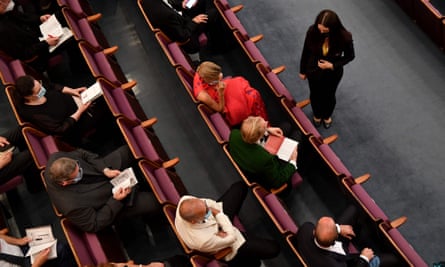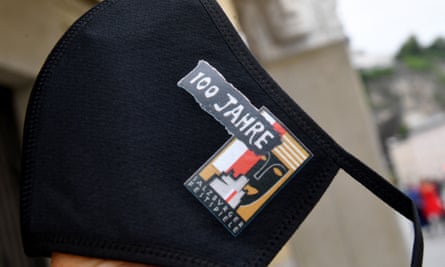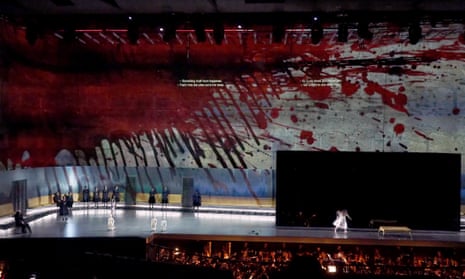At the performances of Richard Strauss’s opera Elektra in Salzburg this week, the scene in the auditorium was almost as alarming as the murderous psychodrama playing out on stage.
Even with a specially reduced seating capacity, the visual effect produced by 1,000 masked audience members looking on at the city’s music venue Felsenreitschule was an uneasy one, in a world where distancing has become the norm.
Still, there was an air of excitement and gratitude among those in attendance, aware that they were some of the few people to be watching live music anywhere in the world. The massed ranks of the Vienna Philharmonic were packed into the pit, and the striking production by the Polish director Krzysztof Warlikowski involved video projections, a swimming pool on stage and much non-distanced anguish.
The production is the centrepiece of Salzburg’s month-long summer festival of music and theatre, one of the few major cultural events to go ahead this summer. Events in Salzburg are being seen as a trial balloon for theatres and opera houses across the world, desperate – for both artistic and financial reasons – to find a way to operate in the age of Covid.
But is holding a festival during a pandemic a powerful artistic response to adversity, or reckless folly?
“If sportsmen can play and if planes can fly then there should be a safe way for us to get back on stage,” said Tanja Ariane Baumgartner, the German mezzo-soprano who sang Clytemnestra in Elektra.

As other festivals were cancelled in spring, Salzburg decided to wait, hoping to salvage at least something from its centenary edition. As Austria’s Covid-19 figures improved in April and May, the plans gradually became more ambitious, growing from a single concert to mark the 100th anniversary to the current 30-day series, decided upon when the government announced in late May that by August, audiences of up to 1,000 people could gather.
The festival’s executive director, Lukas Crepaz, recalled that the founders of the festival had planned the first one in 1920 in much more difficult conditions than today, which provided inspiration even as the organisers were aware of the risks.
“You have to find the balance. We said we wanted a festival that makes sense artistically and is affordable but health and security is above all,” said Crepaz.
The festival engaged a team of medical experts to provide an overview of all their plans, and, based on their recommendations, it was decided to abandon intervals in all the productions and have no refreshments for sale inside venues. One thing clear from the beginning was that singers and musicians could not feasibly practice social distancing, and the whole cast undergoes a cover swab test after every performance.
“We always knew we could minimise the risk but we also knew there would be cases of infection,” said Crepaz. After the first week, everything has gone more or less to plan, and no infections have been reported among performers or attendees, except for one administrative employee who tested positive before the start.
The pianist Igor Levit, who is playing a cycle of Beethoven concerts at the festival, praised the careful setup in Salzburg. However, he said the calls from some artists to simply get back to normal musical life were “beyond stupid” and dangerous.

“We are in a pandemic, and fewer things annoy me these days more than some of my colleagues who are shouting out, ‘Open the concert halls!’ You unempathetic people, shut up and read the news. There are people dying!”
In music-mad Austria, finding a way for classical music and opera to return has been at the top of the agenda in recent months. For the Vienna Philharmonic, the festival’s house orchestra, the three-month pause in concerts this year was the longest break since it was founded in 1842, and the orchestra has been desperate to get back to playing.
Daniel Froschauer, a member of the board of directors of the Vienna Philharmonic and one of its violin section leaders, said he had two telephone conversations with the Austrian prime minister in the spring about the best way for the orchestra to perform at Salzburg and plans going forward. “Our prime minister comes to our concerts. It’s an issue for him,” he said.
The orchestra is playing a full programme at the festival as well as being in the pit for the two operas, but plans beyond that look more hazy. Just this week, autumn engagements in Athens and Istanbul were cancelled, while the fate of an Asia tour in October and November is up in the air.
Froschauer said if there was a silver lining from the enforced break, it was a new appreciation of their privilege. “If you play an opera every night you get a bit desensitised. But when you’re pulled out of this whole thing, it becomes very emotional,” he said, adding that for him, the two-and-a-half hours of Mozart’s Così Fan Tutte at the festival “went by in one minute in my head”.
Levit, who attracted thousands of new fans with nightly streamed concerts from his home during lockdown, said safety had to be the first priority. He noted, however, how rewarding it was to be back in front of a live audience. “When I walked out on stage for the first Beethoven night, simply to hear people breathe just blew me out of my shoes,” he said.









